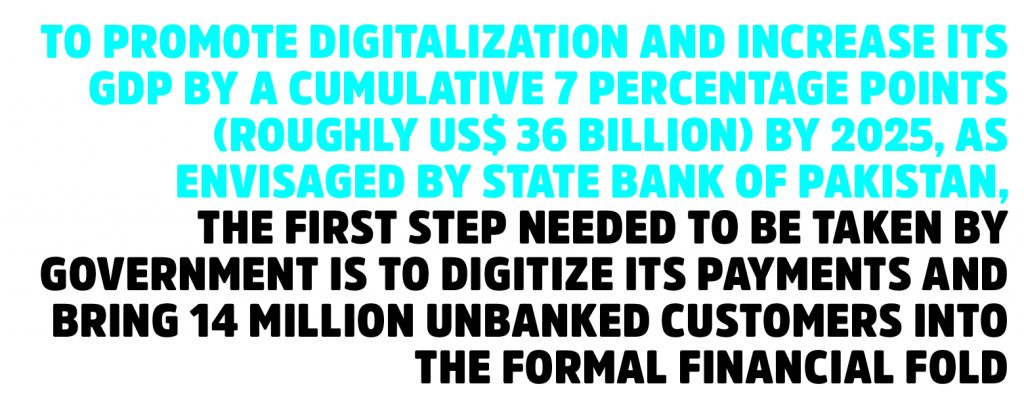
According to the World Bank, approximately two billion people do not use formal financial services and more than 50 per cent of adults in the poorest households are unbanked. Financial inclusion is a key enabler to reducing poverty and boosting prosperity. Financial inclusion means that individuals and businesses have access to useful and affordable financial products and services that meet their needs–transactions, payments, savings, credit and insurance–delivered in a responsible and sustainable way.
To promote digitalization and increase its GDP by a cumulative 7 percentage points (roughly US$ 36 billion) by 2025, as envisaged by State Bank of Pakistan, the first step needed to be taken by government is to digitize its payments and bring 14 million unbanked customers into the formal financial fold.
With the visible growth in usage of digital technology and its penetration in financial services worldwide, digital technologies are also fast being deployed in Pakistan for new mobile accounts, carrying out funds transfers, introducing electronic payment systems, etc.
Confronting the huge challenge of digitizing Pakistan, with no major competitors in the country, a non-profit organization Karandaaz Pakistan has taken number of steps for digitalization of Pakistan especially in the financial sector.
Karandaaz Digital aims to catalyse the financial services industry towards greater financial inclusion by employing cutting-edge innovations and digital solutions for social impact. Karandaaz collaborates across the financial services ecosystem to maximize impact through improved access to digital finance for low income, rural, and otherwise excluded population segments, especially women. With $32 million in funding from the Bill & Melinda Gates Foundation, Karandaaz Digital aims to work with all stakeholders to facilitate digitization of government and other payment streams and provide support to innovative digital financial service startups. The focus areas of the unit are divided into four work streams.
Rehan Akhtar, Chief Digital Officer, Karandaaz Pakistan shared the details of Karandaaz Digital unit and its activities. A major task of the organization is to ensure government’s payments of over Rs5 trillion to be through digital channels.

Under the digital unit, one of the major programs of this organization was to collaborate with State Bank of Pakistan for establishing micropayment gateways which will substantially reduce the cost barriers to reaching the poor with financial services through interoperability between accounts, including branchless banking. According to Rehan, it is expected that through this initiative, 84% of the unbanked population can be served and approximately Rs5 trillion worth of government payments can be digitized. Karandaaz Pakistan, in partnership with SBP, sees this initiative as a significant effort in helping the poor to access financial services and thereby improving their lives.
Ensuring transparency in government projects
The major contribution of digitalizing payments is to ensure transparency in the execution of government projects. Rehan believes there is substantial evidence to show the benefits of digitizing government payments in improving transparency and efficiency and advancing financial inclusion. Karandaaz Pakistan is working jointly with major government stakeholders to digitize Person to Government (P2G) and Government to Person (G2P) payments through the following initiatives:
Micropayment gateway: In the move to make the government’s payment digitalized, Karandaaz Pakistan has been engaged with the State Bank of Pakistan (SBP) to establish a micro-payments gateway. This will substantially reduce the cost barriers to reaching the poor with financial services through interoperability between accounts, including branchless banking.
It is expected that through this initiative, 84% of the unbanked population can be served and approximately Rs5 trillion worth of government payments can be digitized. Karandaaz Pakistan, in partnership with SBP, sees this initiative as a significant effort in helping the poor to access financial services and thereby improving their lives.
Digitization of National Bank of Pakistan: Apart from collaboration with SBP, Karandaaz is also engaged with National Bank of Pakistan which collects and disburses around Rs8 trillion per year, primarily through manual processes. Karandaaz supported NBP to develop a strategy to digitize these payments and develop a platform based on an open API approach. The partnership is an opportunity to digitize government payments and bring 14 million unbanked customers into the formal financial fold.
Digitization of National Savings: Rehan says another major contributor in digitalizing the payments is Central Directorate of National Savings (CDNS) which has also been engaged by Karandaaz in digitizing its banking systems and data and enabling alternate delivery channels to better the capacity of CDNS to extend financial services to low-income and excluded segments.
Kissan E-Credit Scheme: Apart from the banking system, Rehan says Karandaaz is providing technical assistance to the Punjab agriculture department to support the five-year Kissan (Farmer) Package Program aimed at digital and financial inclusion of farmers. The intervention aims to reach 500,000 smallholder farmers who will be provided interest free loans.
He said Karandaaz provided assistance to the Agricultural Department in designing the overall farmer’s registration and payments process flow and on technical integrations with different banks to provide loans. Karandaaz also provided technical assistance to develop the digital apps for the farmers on their smartphones.
Money order digitization: Besides, Karandaaz provided technical assistance to Pakistan Post for digitizing its money order service to build new business opportunities, improving service penetration and providing efficient, transparent and convenient services to its customers.
Innovation and incubation: According to Rehan, Karandaaz Digital partners not only with government channels but also with commercial service providers, private firms, and FinTechs to develop and test digital payment solutions with the prospect of reaching millions of new customers who are otherwise financially excluded or have limited access to financial products and services.
Improved digital connectivity is reshaping consumer behavior, which is increasingly tilted in favor of convenience, cost savings, and customized retail experiences. Businesses are also capitalizing on opportunities emerging from digitization, such as supply chain efficiency, lower transaction costs, and enhanced flexibility in addressing consumer needs.
Value chain payments: Karandaaz partnered with one of the leading private banks in Pakistan to conduct a pilot for digitizing payments to 6,500 last-mile retailers and 10 distributors to understand merchant motivations for adopting digital payments as well as technology requirements.
User Interface and experience: Karandaaz conducted a user interface and experience (UI/UX) study based on human centered design (HCD) principle with one of the leading mobile network operators. The operator redesigned its mobile money app using an HCD approach to increase access to financial services through a well-designed smart phone interface.
FinTech disrupt challenge: Karandaaz conducts a FinTech Disrupt Challenge in Pakistan to identify and support innovative solutions in the FinTech space. Till date, Karandaaz has provided grant funding to 10FinTechs including Ricult Pakistan, Publishex Solutions, Paysys Labs, Credit Fix,Unikrew Solution, Agri-Gate, Invoice Waqalah, Matilda Solutions, Love for Data, and AgriMart.
Research and data analytics: Talking about another task of his company, Rehan says Karandaaz Digital also conducts research, assessment, and digital experimentation to assess the pricing and product adaptation possibilities for digital financial services among low income segments. This project includes:
Customer segmentation study: Karandaaz partnered with Dalberg and Rockefeller Philanthropic Advisors to develop a nuanced framework for analysis and action in designing and delivering digital financial products based on people’s attitudes, behaviors, experiences, and preferences for money and technology. The study also focuses on understanding the reasons for the gender gap in financial inclusion.
Human-centered design study on Benazir Income Support Programme (BISP) beneficiaries: This study evaluates the biometric verification system (BVS)-based cash withdrawal process for BISP beneficiaries. Insights and recommendations from this study are expected to assist in redesigning the withdrawal process and for scaling across the country.
Fintech Center, Information Technology University (ITU): Karandaaz has partnered with ITU to conduct actionable research by the FinTech Center at ITU to understand the digital financial services needs of female micro-entrepreneurs, develop a women-focused mobile solution for a Digital ROSCA (Rotating Saving and Credit Association), and find solutions for safeguarding women against fraudulent SMS.
Retail payments study: Karandaaz has conducted a research study to understand the factors hindering the uptake of digital solutions for retail payments in Pakistan. This study also undertook a detailed segmentation exercise to understand the pain points and requirements of each merchant segment.
FINCA roaming SIMSIM facilitators experiment: Karandaaz is conducting a pilot in partnership with FINCA Microfinance Bank for mobilizing economically active women in peri urban/rural areas in the use of digital financial services through Roaming Female SIMSIM.
Policy and regulation: The important part of digitalization in Pakistan, according to Rehan, will remain incomplete until the issues related to regulation are resolved with the help of government. Karandaaz Digital envisages an enabling environment for the promotion of digital financial services in Pakistan. Karandaaz identifies critical regulatory gaps, challenges and barriers restricting digital financial inclusion and conducts research to inform deliberations on addressing those barriers.
In order to engage with regulators, policy makers and relevant stakeholders, Karandaaz also develops policy briefs to identify regulatory barriers and highlight opportunities to advocate for policy reform to drive the adoption and usage of digital financial services in Pakistan.
Digital banking regulations: Karandaaz has signed an agreement with State Bank of Pakistan under which it is providing technical assistance to the bank for formulating legal and regulatory framework including licensing criteria for digital banks. This will help create an enabling environment for digital banks and streamline the regulatory and supervisory framework.
Karandaaz Pakistan
Karandaaz was established in 2014 and registered with the Securities and Exchange Commission of Pakistan as a nonprofit organization. Basically, it is aimed at promoting access to finance for small businesses through commercially directed investments and financial inclusion for individuals. In regard to the projects of the organization it is funded by United Kingdom’s Department for International Development (DFID) and the Bill & Melinda Gates Foundation (BMGF). Karandaaz operates through four programme vehicles: Karandaaz Capital, Karandaaz Digital, Karandaaz Innovation and Knowledge Management & Communication.



